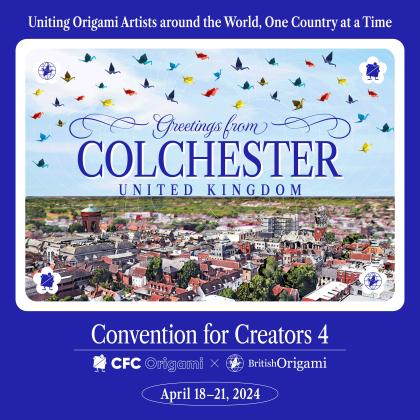CFC4 Colchester
The Convention
The Fourth Convention for Creators occurred in Colchester, England, in April 2024. It was back-to-back with the BOS Spring Convention.
With 37 participants, CFC4 included 9 talks, 5 panels, and two open discussions. All dealt with the many faces of Origami, papers, design techniques, the CFC as a community, the CFC site, and many other issues.
The BOS sponsored the convention.
Image Gallery
CFC4 Talks and Presentations
The CFC4 Program
Recorded Talks and Panels
Writing Your Own Origami Book, by Peter Buchan-Symons
A talk giving some of my experiences writing origami books. Some things I could include (I'd be flexible around what other people are talking about): designing the models, diagramming, layout, photography, testing/proofreading and publication.
Failure, most often the biggest and best part of success, by Bernie Peyton
Failure and how to harness it is a critical and huge part of the creative process. We will discuss how to best use failure toward success. Topics will include conceptual errors from the start, inadequate research and experimentation, lack of focus and documentation of the process, inability to self-critique, degrees of failure, and how to embrace failure. Lastly, I hope we will discuss the relationship between failure and faith.
AI Generated Images, by Tung Ken Lam
Artificial Intelligence took off in 2022 with StableDiffusion, ChatGPT, Dall-E, Midjourney and other services. What are they and how can they be of use to us? What are the implications? This is short presentation with time for discussion.
Panel - Preserving the origami legacy of famous creators - and yours, led by Michał Kosmulski
A group discussion about preserving the designs and models of deceased origami creators - both "famous" people, and each of us. I can give some examples based on my experience of working with the legacy of Shuzo Fujimoto: unearthing his life's story, creating a list of his designs, and taking care of models he folded himself as well as of some of his letters. But I also want to discuss how each designer documents their own work, and how we can ensure that it does not go lost when we die or are incapacitated. I also want to mention the issues related to digital data, such as ensuring that web sites and social media accounts remain available, and the issue related to personal digital files.
Why I now avoid the term origami in my work, by Dewi Brunet
How using the term origami could be negative in your work? Is there an alternative? As a professional in the field for almost a decade, I recently changed my communication to avoid using the term origami in my work preferring the broader term folding.
Book writing and publishing, by Tung Ken Lam
What is the state of book writing and publishing today (for the strategically minded, Porter’s Five Forces model may be relevant https://en.wikipedia.org/wiki/Porter's_five_forces_analysis)?
How viable are books compared with other methods for teaching and learning, e.g. video, either recorded or live?
Are the financials benefits worthwhile compared with digital marketplace services for subscriptions, crowdfunding or sales, e.g.Patreon, Kickstarter, Ko Fi, OrigamiUSA https://origamiusa.org/catalog/file-downloads, etc.?
Who’s in the market (consumers, buyers, authors, publishers and other intermediaries)? How should we market books today?
Creating an Origami Calendar - the story of the Origami Bristol Calendar 2023
The story of the creation of the Origami Bristol Calendar 2023. This took in total of over 40 years to make from start to finish, including designing the models over many years, how these were inspired, the creative process, making scenes representing places and subjects from where I lived, and taking photos of the finished artwork (some historic photos). I will give examples of other similar calendars and projects. I'd like to also get ideas from the audience for future projects and any helpful tips from other people's experiences
Origami, circuits and LEDs, by Michael Shannon
Results of my exploration into the integration of circuitry + LEDs and origami.
How to rekindle the creative process? Led by Ilan Garibi
The joy from the first model is beyond comparison to the joy from your 250th. As we grow up as creators, the passion and satisfaction of creating may dwindle tremendously. How one can fight it, if at all?
Origami Sketches from faces to architecture, by Ynon Toledano
The common lines between designing masks and facades - from the human face to architecture.
Why your origami is NOT ART - and why it IS, by Lee Armstrong
Often in the community, there are debates about whether origami is an art or a craft. In the creative community, some feel frustrated that origami is not more respected as an art form. I will bring perspectives from gallery curators, philosophers, artists, and others to make the case for origami as art, and why origami could offer something other art forms cannot.
As this topic where others have opinions, we will have some time to discuss the ideas (and probably disagree, in a friendly way) after the talk.
